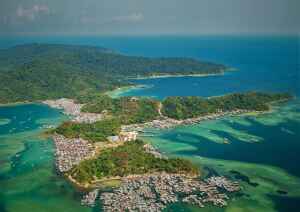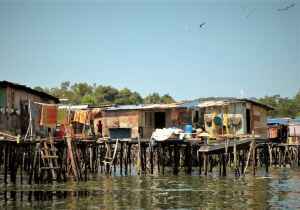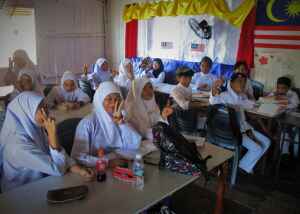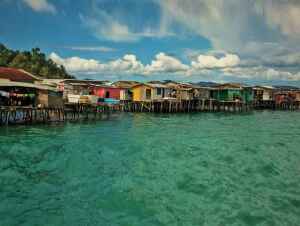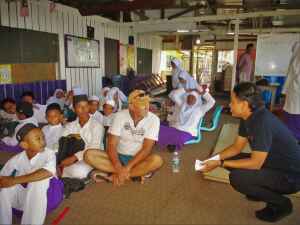It stinks!
It stinks of rot and excrement. With every step I take on the rotten planks, I fear I'll break through and fall into this black paste.
But first things first:
There is a settlement on this island...or rather a slum in a bay where economic refugees from Mindanao have lived for generations in houses made from stilts.
Although these people original from the south of the Philippines have lived here for generations (most of them were born here and are Muslims) they have almost forgotten their native language and only speak Malay.
Still, they have no rights, let alone any hope of naturalization.
We walk across the island to the stilt village with countless of houses in the water.
After climbing the bone-breaking paths from the hill down to the village passing piles of plastic waste in which cows search for something to eat and a cemetery that also resembles a garbage dump, we stand on these planks above the black, stinking mud that function as "roads" between the houses.
Since these stilt houses erected here in the Gaya Island is illegal naturally they have no waste disposal, no sewage system and no canalization. Environmental awareness is unknown, everything has been ending up under the houses directly in the sea for decades.
To the detriment of our sense of smell, it is currently low tide and the contaminated mud can fully develop its "smell".
It doesn't bother people.
They greet us in a friendly manner, children laugh and are happy about the exotic visit, shouting "whatsanam, watsanam". I think this is a Malaysian greeting and answer the kids in the supposed national language and shout back "WHATSANAM"... until Frel translates for me that the kids ask "what's your name"... Oh, I see…
We are invited to the village school and the kids look at us in amazement. They rarely have visitors here.
There are 3 classes. From first to third, from fourth to seventh and from seventh to tenth.
Mohamed, a boy in the second class, is already 16 and I think to myself, he has often been held back, until the teacher tells me that Mohamed enrolled himself in school last year because he wanted to learn to count and write.
Respect!
Respect is also shown towards the teachers, everything is very disciplined despite the unusual visit. When I ask about the secret of this discipline, one of the 3 teachers smiles and explains to me that it is tried and tested traditional pedagogical methods. When I look at him questioningly, he shows me a thin bamboo stick that I also knew from my elementary school days.
The teachers here in the village are not paid by the state, but by aid organizations. The starting salary is 500 ringit a month (equivalent to 100 euros!). He has been there for a few years now and receives 1200 Ringit a month.
Even though the state does not finance the school, it still sets the curriculum. Main subject: religion!
After finishing school, the students can recite all the Koran suras by heart, but they need a calculator to add up 2.50 & 2.50. Well...you just have to set priorities in life.
Compared to students in the western world, these here and elsewhere in so-called developing countries are always friendly and courteous, enjoy little things and always have a smile.
Perhaps religious education could be halved and environmental awareness could be included in the curriculum instead...but that's just an idea.
On the way back, it becomes clear to me again what a high level of complaining we are in the western world.
Enough "civilization" - we go back on board and enjoy our lonely, uninhabited bay.

